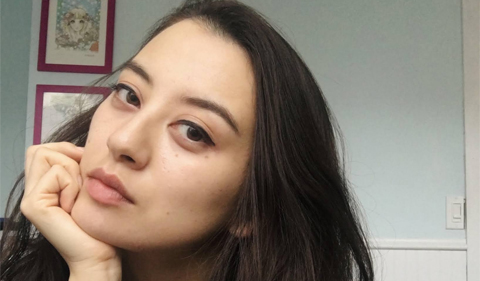By Morgan Riedl
Ohio University’s English Department virtually presents writer Nina Li Coomes for this year’s Spring Literary Festival at 10:30 a.m. on Thursday, March 18.
Coomes is a Japanese and American writer born in Nagoya and currently residing in Chicago, where she is a student at the Litowitz MFA & MA in nonfiction. Her writing has appeared in The Atlantic, EATER, and Catapult, among other places, and has been nominated for a Pushcart Prize and a Chicago Review of Books Award. Her Longreads essay, “Notes on Citizenship,” which uses her experience having dual citizenship to question how we define home, belonging, and even humanity, was listed as a Notable Mention in Best American Travel Writing 2020. In 2018 she was an Aspen Summer Words Fellow in Memoir, and in 2019 a Tin House Scholar. In addition to her creative nonfiction, she has published both fiction and poetry including Haircut Poems, a chapbook published by Dancing Girl Press, and is also a film reviewer and regular contributor at the Chicago READER.
Her essay “On Jellyfish,” published in Wildness and included in their Omnibus edition, earned a nomination for Best American Essays 2019. In this three-part piece, Coomes uses the body of a jellyfish to examine her own experience of depression. With lyrical prose that itself takes on the otherworldly feel of a jellyfish while also exposing the metaphorical implications of how it exists in the world, she is able to dive deep into the question of what it means to be truly alive and, even more so, to want to be. The first time she sees a jellyfish, she describes it this way: “The eyeless jelly glistened on the sand, apathetic and opaque, slumped as if to say dead or alive, who cares? Can something with such a thin will be alive?” A few sentences later, the narrator herself becomes the sea creature, submerged in a bathtub, pondering disappearance. Through the translucent lens of the jellyfish, the narrator is able to not just understand her own feelings but also imagine a new way of experiencing the world, ultimately finding a desire to stay in it. In the last of the essay’s three segments, she envisions exchanging her own central nervous system for a jellyfish’s nerve net, in which “neurons scattershot like constellations through their forms, feeling everything at once, but nothing specifically.” She then relives, in a single moment, through a spectacular compression of time, a mosaic of euphoric memories and ecstatic sensations like “the feeling of good cinema, how it pushes your heart just slightly wider; … the way summer sidles up flirtatiously and suddenly you are bare-armed and dancing; walking home; your mother; mama; the slow swivel of your faces towards the light; every morning your father prays Thank you God, for fresh air and blue sky; a preponderance of evidence; a totality flush against your skin; everything specifically and nothing at all.” So, through wearing the cellophane-like skin, she reaches for transcendence and finds her desire to remain here and alive.




















Comments